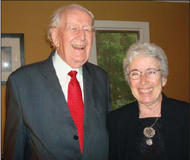ICAR's 25th Anniversary Celebration
ICAR's 25th Anniversary Celebration

May 14, 2008, saw the Institute for Conflict Analysis and Resolution (ICAR) celebrating it first 25 years with a gathering of over fifty faculty, staff, advisers, and alumni, at Point of View for an evening of stories and reminiscences of the early days when GMU's new Masters program was being taught at the Center for Conflict Resolution (CCR), which a few years later became the Center for Conflict Analysis and Resolution (CCAR).
Prominent among those present were members of the original Advisory Board that, together with Ed and Helen Lynch, helped to launch the new Center and the idea of conflict resolution in Northern Virginia. Mary Lynn Boland, the first administrator of the Center could not be present but sent greetings, as did Mary Clark the first to be appointed to the Drucie French Cumbie Chair at ICAR from the West Coast. Dr. Dennis Sandole, the very first faculty appointed to the then new Center spoke about the late Dr. Bryant Wedge, the founder and first Director of the Center. A plaque in Dr. Wedge's memory, which had originally been placed outside ICAR's old offices on the Fairfax campus, was re-sited on the Point of View grounds close to the Lynch house.
Dr. Sara Cobb, the present ICAR Director, introduced the Australian Ambassador, the Honorable Dennis Richardson A.O., who unveiled a portrait of Dr. John Burton, Associate Director of CCAR between 1986 and 1991. The full length portrait of Dr. Burton, painted by the Australian artist Helen McInnes, had been donated to ICAR by Mrs. Betty Nathan Burton who was present at the event and brought a message from John Burton from Canberra encouraging the expansion of the work of education and Conflict resolution.
In many ways, the event—while enjoyable for those present was a small and low key one, particularly given the number of individuals from all over the world that had graduated from CCR, CCAR, and ICAR, over the last 25 years. ICAR graduates, now numbering over 400, are currently working in over 35 countries in all regions of the world, applying their skills to problems of local, environmental, inter ethnic, and international conflicts. Clearly, the challenges posed by such conflicts will remain to be tackled by the next generations of ICAR faculty and graduates during the next 25 years.




